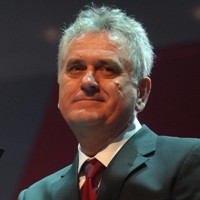BELGRADE, Serbia -- The election of a former ultranationalist as Serbia’s new president has been greeted with surprise in some quarters and alarm elsewhere. But despite Tomislav Nikolic’s far-right past and his penchant for nationalist rhetoric, a radical change in direction by Serbia seems unlikely. Indeed, Nikolic looks likely to find himself presiding over a government headed by the man he defeated, newly ex-President Boris Tadic.
Nikolic narrowly defeated the Western-leaning and liberal Tadic on May 20, confounding the widespread assumption that Tadic, president from 2004 until his tactical resignation in April, was a shoo-in for re-election. The victory for Nikolic, who is seen as a somewhat uninspiring figure in contrast to the charismatic and energetic Tadic, reflects growing frustration with Serbia’s economic crisis and anger at the political elite. Low turnout probably also helped Nikolic across the line.
The president-elect was defeated by Tadic in the previous presidential election, in 2008, when Nikolic ran as the candidate of the Serbian Radical Party (SRS), an ultranationalist outfit that rejects Serbia’s European Union accession efforts and instead advocates a pro-Russian policy, as well as the formation of a “Greater Serbia” through the annexation of territory from neighboring countries where Serbs live.

